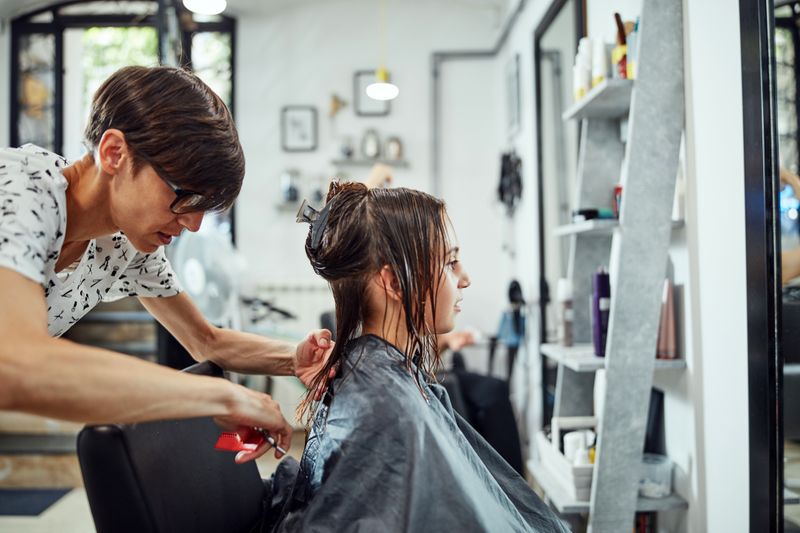We often hear that first impressions matter, but did you know they form within seconds? Before you even say hello, people are already sizing you up based on what they see. These snap judgments can affect everything from job interviews to first dates. Let’s explore what others notice about you in those crucial first moments of meeting.
1. Your Posture Tells a Story
Standing tall signals confidence while slouching suggests insecurity or fatigue. The way you carry yourself speaks volumes about your self-image and energy level.
People unconsciously associate upright posture with leadership qualities and positive attitude. Those with rounded shoulders might be viewed as less assertive or even uninterested.
Next time you enter a room, imagine a string pulling you up from the crown of your head. This simple trick can transform how others perceive your presence and authority before you’ve uttered a single word.
2. Handshake Strength Reveals Character
A firm handshake often leaves people thinking you’re trustworthy and confident. Too limp? They might assume you’re timid or disinterested. Too crushing? You could come across as aggressive or domineering.
The perfect handshake involves dry palms, moderate pressure, and about three seconds of contact with eye connection. Cultural differences matter too – what works in New York might not fly in Tokyo.
Practice your greeting grip with friends for honest feedback. This small physical connection forms a powerful first impression that can color an entire relationship from the start.
3. Facial Expressions Broadcast Your Mood
Your face is constantly sending signals about your emotional state. A genuine smile reaches your eyes (creating those little crow’s feet), while a forced one stays at the mouth and appears fake to observers.
Furrowed brows, tight lips, or a blank stare might make you seem unapproachable or judgmental, even when you’re just thinking. Many people don’t realize their resting expression might be sending unintended messages.
Try checking your neutral face in a mirror or phone camera. If you’re surprised by what you see, practice softening your expression slightly for situations where first impressions count.
4. Clothing Choices Signal Your Values
Your outfit works like a visual resume, telling strangers about your personality, attention to detail, and social awareness. Clean, well-fitted clothes suggest organization and self-respect regardless of price tag or style.
Colors make statements too – darker shades often read as authoritative while brighter ones signal creativity. Accessories show personality, but too many can distract from your message.
The key isn’t following trends but understanding what your clothes communicate in different contexts. Even casual clothes can look intentional when they’re appropriate for the setting, creating an impression of someone who understands social cues.
5. Punctuality Reflects Reliability
Arriving on time – or better yet, a few minutes early – sends a powerful message about how you value others’ time. When you’re late, people might assume you’re disorganized or consider yourself more important than them.
Cultural norms around timing vary globally, but in most professional settings, punctuality acts as a proxy for dependability. Those crucial minutes before a meeting or interview allow you to settle in and present your best self.
Smart time-managers build buffer time into their schedules, accounting for unexpected delays. This habit prevents the flustered, apologetic entrance that can undermine an otherwise strong impression.
6. Personal Grooming Indicates Self-Care Habits
Clean nails, tidy hair, and fresh breath might seem like small details, but they create an overall impression of someone who manages their life well. Basic grooming signals respect for yourself and for those you’re meeting.
Research shows that neatly groomed individuals are often perceived as more competent and reliable, regardless of their actual abilities. This doesn’t mean expensive haircuts or designer perfume – just thoughtful attention to cleanliness and presentation.
A helpful tip: keep a small emergency kit with breath mints, a comb, and stain remover in your bag or desk. These tools can save your impression when unexpected situations arise before important interactions.
7. Eye Contact Demonstrates Engagement
The way your eyes meet others reveals your confidence and interest level. Steady eye contact suggests honesty and engagement, while constantly looking away might make people wonder if you’re hiding something or simply not interested.
Finding the right balance matters – staring too intensely can make others uncomfortable. Aim for the natural rhythm of meeting eyes for a few seconds, briefly glancing away, then reconnecting.
For those who find direct eye contact challenging, a useful trick is focusing on the triangle formed by the other person’s eyes and nose. This creates the impression of eye contact while feeling less intense for you.
8. Personal Space Awareness Shows Social Intelligence
Standing too close makes people uncomfortable while keeping excessive distance might seem cold or aloof. Understanding appropriate personal space demonstrates your social awareness and respect for others’ comfort.
The ideal distance varies by culture and relationship – in North America, about arm’s length works for professional interactions. Notice how others respond to your proximity; if they step back, you might be crowding their bubble.
Remember that some situations naturally adjust these boundaries. Crowded elevators require closer proximity, but maintaining respectful positioning and avoiding unnecessary contact shows consideration that others will notice and appreciate.
9. Digital Footprint Precedes Physical Presence
Many people Google you before meeting in person. Your social media profiles, online comments, and digital presence form impressions before face-to-face interactions ever occur.
Professional photos and thoughtful posts suggest someone who considers their impact, while questionable content raises red flags. Even your email address matters – cutesy or inappropriate handles might undermine credibility in professional contexts.
Take time to audit your online presence occasionally. View your profiles as a stranger would, adjusting privacy settings and content to align with how you want to be perceived. This digital first impression increasingly matters as much as your physical one.
10. Scent Creates Powerful Memory Associations
Your smell creates lasting impressions that bypass conscious thought. Clean, subtle fragrances generally leave positive impressions, while strong perfumes or body odor can overwhelm a first meeting.
Studies show scent connects directly to the brain’s memory and emotion centers. This means people might not remember exactly how you smelled, but they’ll remember how that smell made them feel about you.
A good rule: fragrance should be discovered, not announced. When someone leans slightly closer to you in conversation, that’s when a pleasant scent should become noticeable – not when you’re still across the room.










